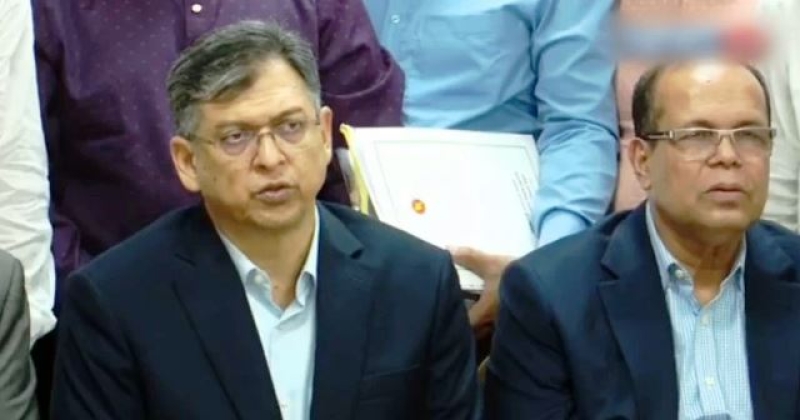- Arab-Islamic Summit Warns Israel Attacks Threaten Ties |
- South-South Cooperation: Building Innovation and Solidarity |
- Consensus must; polls to be a grand festival: Prof Yunus |
- Salahuddin sees security risks if polls miss February deadline |
- Qatar denounces Israel before major summit over Doha attack |
Salahuddin sees security risks if polls miss February deadline

Salahuddin Ahmed, BNP Standing Committe member speaking at the National Consensus Building Commission meeting at the Foreign Service Academy on Sunday
Offering Chief Adviser Professor Muhammad Yunus the full liberty to find a way to implement the reform recommendations related to the Constitutional amendment, BNP senior leader Salahuddin Ahmed on Sunday warned that failure to hold the next national election within the announced February timeline could pose national and regional security threats.
“Please find a fully implementable process. You have already taken opinions from many experts. If you feel any of their suggestions are appropriate and decide to implement them, you are at liberty …we will have no objection,” he told the Chief Adviser.
Speaking at the National Consensus Building Commission meeting at the Foreign Service Academy, in the presence of the Chief Adviser, the BNP leader also urged Prof Yunus to seek opinions from the judiciary if he thinks it necessary.
“We do not think that 15 out of 19 constitutional reform proposals are legally feasible for implementation in the current context. But if you take the initiative, consult the judiciary, or decide on another course of action, and invite us to discuss it, we will always cooperate,” he said.
Salahuddin, a BNP Standing Committee member, however, said reforms, justice and elections should not be seen as mutually interdependent.
“Reform will continue as reform is a continuous process. Justice can never be bound by a time limit...no matter which government is in power, the trial will go on,” he said.
The BNP leader mentioned that their party leaders and workers have been the worst victims of injustice, enforced disappearances, killings, and repression during the rule of the Awami League.
“So, holding the trials is our commitment and the nation’s commitment, and this will continue. But elections cannot be made conditional on these issues,” he said.
Salahuddin warned that creating uncertainty over the election in February, as per the commitment of the Chief Adviser, will only serve fascist forces.
“If we take any actions that give fascist forces an opportunity or indulgence, many believe it would become a national security threat. I think it could even become a regional security threat. Two regional powers and a global power could get involved. We do not want to take Bangladesh into that situation,” he said.
Reaffirming BNP’s position, Salahuddin said the election must be held on schedule in February as directed by the Chief Adviser.
“There can be no conditions attached to it. We believe that through further efforts by the National Consensus Commission, and with the Chief Adviser’s personal initiative, a solution will be achieved,” he concluded.
About reaching a national consensus on many issues, he said there are still several areas that need reform, which perhaps could not be fully traced due to time constraints. “Those issues need to be traced and addressed in the days to come.”
The BNP leader said they received 826 proposals for reforms and submitted their party’s written opinions after discussions in the party forum. We disagreed on only 51 proposals, and placed different views over 115 proposals.
He warned against the faulty implementation process saying the reforms will not sustain if it is challenged in the court in future. “It should take a proper time to make the implementation sustainable,” Salahuddin said.
Referring to dissenting notes on some issues in the National July Charter, he said the ‘notes of dissent’ were registered on some of the 19 constitutional issues and the political parties should sign the charter with notes of dissent. The party which gets the public mandate (in the election) must implement the charter except the issues with their notes of dissent.
Over the question of authority to implement the constitutional reform issues by any other forum other than parliament, the BNP leader said the legal advice can be taken from the Supreme Court on this. “We can go there and take assistance (from the Supreme Court). “Beyond that, if there is anything, let us know—we agree. We are ready to sign the Charter,” he said.
Calling for keeping up the anti-fascist unity and transforming it into strength, Salahuddin said compromise and more negotiations are necessary to find an implementation way. “If any path is found through dialogue, we will agree.”
Noting that the final version of July Charter has some clerical mistakes and slight confusion. He said, “We will correct those—it is not major.”
But since it is a national, political, and historic document, it must be flawless. Issues not discussed should not be included. The less the controversy, the better,” he said.
Describing the July Charter as a national and historical document of political compromise, he said it must be flawless.
Salahuddin said the Charter should be kept above the Constitution and should be made immune from judicial review. “No document can exist that cannot be questioned in court. Placing the Charter above the Constitution is unacceptable. Still, there are ways to give it legitimacy—such as seeking advice from the Appellate Division whether an Extra Constitutional or Special Constitutional Order can be issued,” he said.
National Consensus Commission Vice Chair Prof Ali Riaz, Law Adviser Dr Asif Nazrul, Jamaat leader AHM Hamidur Rahman Azad and National Citizen Party leader Akhter Hossen also spoke at the programme, conducted by Chief Adviser’s Special Assistant Monir Haider. - UNB

